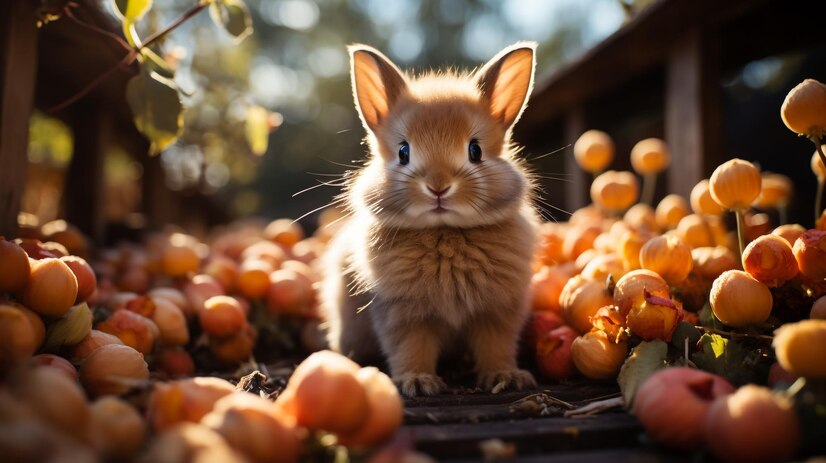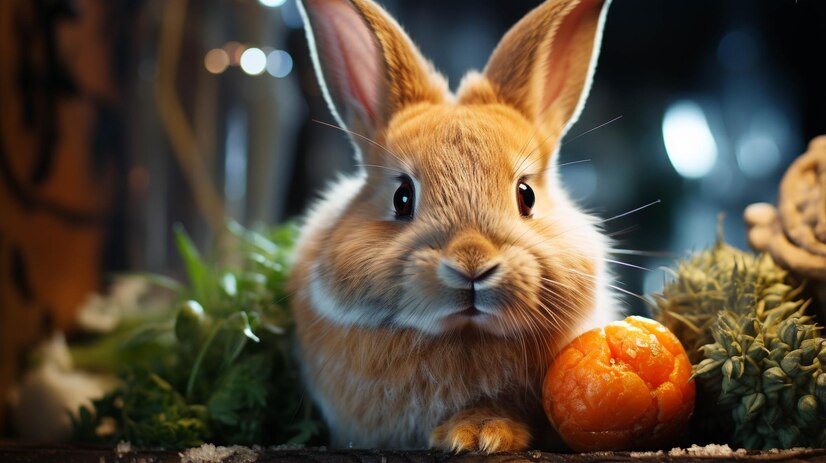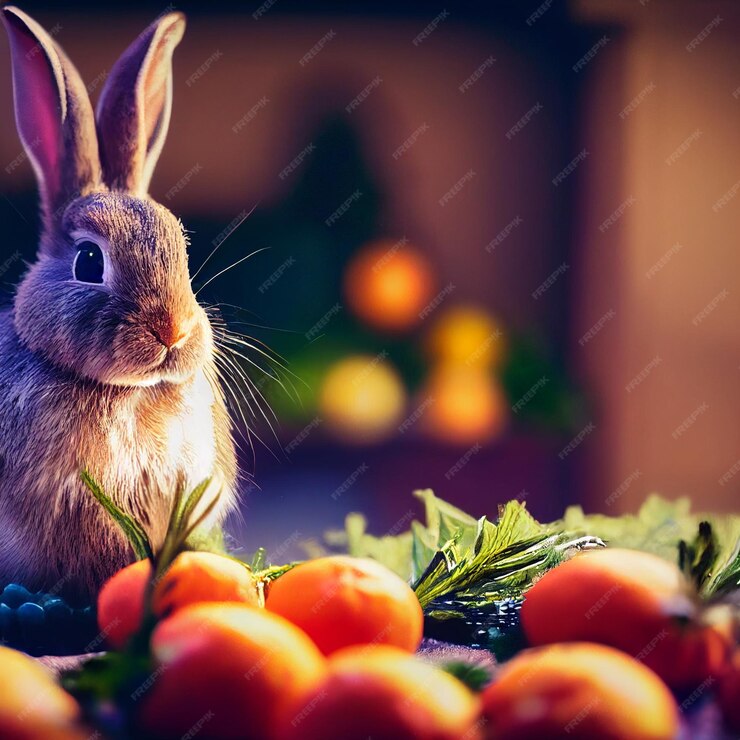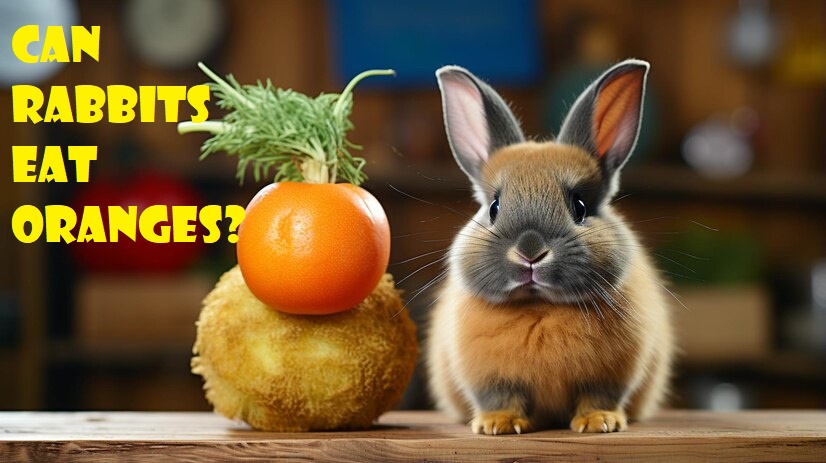Rabbits are known for their love of munching on fresh greens and vegetables, but when it comes to fruits, there can be some confusion.
Oranges, in particular, are a popular choice among humans, but can they be safely enjoyed by our long-eared friends? In this comprehensive guide, we will explore the topic of Can Rabbits Eat Oranges, feeding oranges to rabbits, delving into the nutritional benefits and potential risks. Whether you’re a seasoned rabbit owner or considering adding a bunny to your family, understanding the dos and don’ts of their diet is crucial.
Join us as we unravel whether rabbits can eat oranges and provide valuable insights for ensuring the health and well-being of these beloved pets.
Can Rabbits Eat Oranges?
Yes, rabbits can indeed eat oranges! but moderation is key! These fluffy little creatures can snack on small amounts of oranges as a special treat. It’s important to remember that oranges are high in natural sugars, so feeding them to your furry friends should be in small portions. Too much citrusy goodness might upset their tummies, and nobody wants that!
Always start with tiny nibbles to see how your rabbit reacts. But remember, every bunny is unique, so watch for any signs of tummy troubles or discomfort. And hey, who can resist those adorable nibbles and nose twitches when they get a taste of something zesty? Remember, oranges should only be an occasional indulgence for your floppy-eared pals!

Understanding Rabbit Nutrition
Rabbit nutrition is primarily based on fresh Hay, various vegetables, and a small portion of pellets. Being rich in fibre, Hay helps maintain the rabbit’s gut health and aids digestion.
Various vegetables provide essential vitamins and minerals that contribute to overall health. Although provided in smaller quantities, pellets are a concentrated source of nutrients and should be chosen carefully. Always opt for high-fiber, low-protein, and low-calcium varieties. A rabbit’s diet should be low in fat and sugar.
The latter is where fruit treats like oranges come into play. Although fruits can be given as treats, their sugar content should be limited to ensure the rabbit doesn’t experience digestive issues or become overweight. Therefore, understanding the nutritional composition of oranges and how they can benefit your rabbit is crucial before incorporating them into your rabbit’s diet.
Nutritional Value of Oranges
Oranges are renowned for their high vitamin C content. A single medium orange can provide about 70 milligrams of this essential vitamin, meeting and exceeding the daily vitamin C requirement for humans. While rabbits produce vitamin C, a little extra boost can be beneficial, especially during stress or illness.
Vitamin C can help boost the immune system, protect against cardiovascular disease, and improve skin health. Beyond vitamin C, oranges are a good source of dietary fibre, which aids digestion and can help maintain a healthy weight. They also contain a small amount of essential minerals like potassium and calcium.
However, besides these beneficial nutrients, oranges also contain high sugar. A medium orange contains around 12 grams of sugar. That’s equivalent to about three teaspoons of sugar. They also contain natural acids, which can be too harsh for a rabbit’s sensitive digestive system if consumed in large quantities.
For these reasons, oranges should be considered a treat rather than a regular part of your rabbit’s diet. Remember, your rabbit’s main food should always be Hay, supplemented with various vegetables and a small portion of pellets. Oranges, though nutritious, should only be offered occasionally and in moderation.

Benefits of Oranges for Rabbits
Oranges provide an antioxidant boost for your bunny with their rich vitamin C content. This vitamin aids in stress management and can give your rabbit’s immune system a helping hand. Additionally, the dietary fibre in oranges can assist digestion and weight maintenance. Some Benefits of Oranges for Rabbits
Vitamin C Boost:
Vitamin C, abundant in oranges, is vital to your rabbit’s health. Not only does it aid in collagen production, promoting healthy skin and fur, but it also strengthens their immune system. This helps in fending off illnesses and infections.
Although rabbits naturally produce their vitamin C, a bit of an additional boost, especially during stressful times, can be highly beneficial for their health.
However, this should never be a substitute for proper veterinary care when required. Remember, moderation is key when feeding your bunny oranges to ensure they reap the benefits without adverse effects.
Hydration:
Oranges are composed of about 88% water, making them an excellent source of hydration. Consuming oranges can help supplement your rabbit’s water intake, especially during hot weather when dehydration risk is higher.
However, it’s important to note that while oranges can provide some extra hydration, they should not replace your bunny’s water supply. Your furry friend should always have access to fresh and clean water to ensure optimal hydration.
Feeding them a slice of orange can provide not just a treat but also a burst of moisture, contributing to the overall hydration of your rabbit. Remember, moderation is vital due to the sugar and acid content in oranges. Providing your bunny with a hydrating treat such as an orange slice can be a refreshing and beneficial addition to their diet when given responsibly.
Variety in Diet:
Introducing oranges to your rabbit’s diet can provide a welcome change and add flavour to their meals. This fruit treat can stimulate their interest in food, potentially encouraging them to explore other safe fruits and vegetables.
Just remember, oranges are just that – treats. They should never replace the dietary staples of Hay, vegetables, and pellets. As always, moderation is key to maintaining a balanced and healthy diet for your bunny.
Natural Antioxidants:
Oranges are rich in natural antioxidants like flavonoids and carotenoids. These compounds can help protect your rabbit’s cells from damage by harmful free radicals, potentially reducing the risk of certain health conditions.
Additionally, these antioxidants contribute to the overall well-being of your rabbit by supporting immune health and promoting a healthy cardiovascular system.
Thus, occasional orange servings can give your rabbit a natural antioxidant boost. However, remember to keep orange servings infrequent and small due to their sugar content.
Promotes Chewing:
The unique texture of oranges can also encourage your bunny to chew. This is an important activity for rabbits, as it helps to maintain their dental health.
Rabbits’ teeth grow continuously throughout their lives, and chewing helps to wear them down naturally, preventing overgrowth. Introducing a small slice of orange, with its fibrous rind and juicy flesh, provides a different chewing experience than Hay or pellets.
This can not only provide mental stimulation for your rabbit, but it can also support dental health. Remove the seeds before feeding, as they can pose a choking risk. In addition, the outer peel of the orange can sometimes contain pesticides, so be sure to wash thoroughly or choose organic oranges.
Despite the benefits, remember that due to the high sugar content, oranges should remain an occasional treat and not a daily staple.
How Much Orange Can a Rabbit Eat?
When feeding your rabbit oranges, moderation is the golden rule. A good rule of thumb is to limit the serving size to a teaspoon of fruit per two pounds of body weight. This roughly translates to one or two small slices of orange per serving for an average-sized rabbit.
Remember, oranges should not be a daily indulgence but an occasional treat. You can offer this fruity treat to your bunny once or twice a week, ensuring that it does not overfeed. Introducing any new food gradually into your rabbit’s diet is also a good idea. Start by offering a small piece of orange and monitor your rabbit for any signs of discomfort or digestive upset.
If your rabbit tolerates the orange well, you can continue with the occasional treat. Always remove the seeds, which can be a choking hazard, and wash the orange thoroughly before offering it to your bunny. Following these guidelines will ensure that your rabbit can safely enjoy their orange treat while receiving its nutritional benefits.

How healthy are oranges?
Oranges are often celebrated as a powerhouse of health benefits, and rightly so. Packed with essential nutrients and antioxidants, they can be a beneficial addition to a balanced diet. Beyond their rich vitamin C content, which boosts immune health, they also offer significant dietary fibre.
This can aid digestion, potentially benefiting not only your rabbit’s digestive system but also supporting weight management. In addition, oranges provide key minerals like potassium and calcium, which are essential for maintaining your rabbit’s overall health.
Their high water content also provides a source of hydration, which can be particularly beneficial in warmer months. However, it’s vital to remember the sugar content in oranges. Despite all the health benefits, the high sugar and acidic content requires us to feed them to our rabbits in moderation.
So, while oranges can be seen as a health-promoting fruit, it’s always important to remember that their place in your rabbit’s diet should be limited to an occasional treat.
What are the risks of giving your rabbits oranges?
Feeding oranges to rabbits carries some risks:
- High Sugar Content: Oranges are naturally high in sugar. Feeding too much sugar to rabbits can lead to digestive problems like diarrhoea, obesity, or even dental issues.
- Upset Digestive System: Rabbits have sensitive digestive systems. Introducing new foods abruptly, especially those high in sugar, can cause gastrointestinal upset or diarrhoea.
- Obesity and Health Issues: Over time, excessive consumption of sugary fruits like oranges can lead to weight gain and related health problems in rabbits, such as diabetes or fatty liver disease.
- Potential Allergic Reactions: Some rabbits may have individual sensitivities or allergies to citrus fruits like oranges, leading to adverse reactions like itching, swelling, or digestive distress.
- Dental Problems: Although chewing on an orange slice can help wear down a rabbit’s teeth, the high acidity in oranges might negatively affect their dental health.
To mitigate these risks, offering oranges in small amounts as an occasional treat is crucial. Monitor your rabbit for any adverse reactions and consult a veterinarian before introducing new foods to ensure they’re safe for your pet.
Tips for Feeding Oranges to Rabbits
Feeding your rabbit oranges can be a delightful treat for you and your furry friend, but it’s essential to do it correctly. Here are some tips to help ensure a healthy and enjoyable experience:
- Start Small: When introducing oranges into your rabbit’s diet, begin with a small piece to observe how they react. If they enjoy it and don’t show signs of digestive upset, you can continue feeding them oranges in moderation.
- Remove Seeds: Always remember to remove the seeds from the orange before feeding it to your rabbit. Seeds can pose a choking hazard and should be avoided.
- Wash Thoroughly: Oranges, especially non-organic ones, may contain pesticides on their skin. Always wash the orange thoroughly under running water before offering it to your rabbit.
- Limit Frequency: Oranges should be considered a treat, not a dietary staple. Aim to feed your rabbit oranges once or twice a week at most.
- Monitor for Changes: After feeding your rabbit oranges, observe for any changes in behaviour, appetite, or stool. If you notice anything unusual, stop feeding them oranges and consult with a vet.
- Avoid Orange Juice: Unlike the fruit, orange juice should not be given to rabbits. It’s high in sugar and lacks the dietary fibre in whole oranges.
- Provide Fresh Water: Even though oranges provide some hydration, your bunny must always have access to fresh water.
Feeding your bunny oranges can be a fun and beneficial addition to their diet, but following these guidelines is essential to ensure a safe and healthy experience.
FAQs
Can rabbits eat oranges peels?
While technically not harmful, orange peels can be hard for rabbits to digest and are often treated with pesticides, so it’s best to avoid them.
Can rabbits drink orange juice?
No, rabbits should not be given orange juice. It lacks the beneficial dietary fibre found in whole oranges and has a high sugar content, which isn’t good for their digestion.
Are other citrus fruits safe for rabbits?
Yes, but like oranges, other citrus fruits should only be given in moderation due to their high sugar and acidic content.
Can baby rabbits eat oranges?
It’s best to wait until your rabbit is older before introducing oranges into their diet. Baby rabbits should be fed a diet primarily of alfalfa hay and pellets.
What should I do if my rabbit eats too many oranges?
If your rabbit has eaten a large quantity of oranges, monitor them closely for signs of digestive upset and consult your vet if you’re concerned.
What other fruits can I feed my rabbit?
Other safe fruits for rabbits include apples, pears, and berries. Always remember to introduce new foods gradually and in moderation.
Conclusion
In short, can rabbits eat orange peels, but they should be given in moderation due to their high sugar and acidic content. When properly managed, oranges can provide an array of nutritional benefits to your bunny, such as a vitamin C boost, added hydration, variety in the diet, natural antioxidants, and even a chance for your rabbit to exercise their natural chewing behaviour.
Oranges should be considered as an occasional treat rather than a dietary staple. Always remember to remove seeds, wash the oranges thoroughly, and monitor your rabbit for any changes after feeding them oranges. Above all, prioritize your rabbit’s overall diet, ensuring it primarily consists of Hay, vegetables, and a small portion of pellets.
So let your bunny enjoy the occasional citrus treat, knowing you’re giving them not just a tasty snack but a little boost to their health, too.

